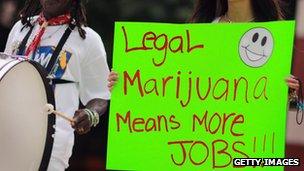US cannabis vote reignites call to legalise drugs
- Published

The US states of Washington and Colorado have voted to legalise the possession and sale of marijuana for recreational purposes, in defiance of federal law, setting the stage for a potential showdown with President Barack Obama's administration.
However, it reawakens the debate about whether banned drugs should go on sale legally.
Not only could such a move potentially open up a huge commercial market, but it could also become a source of tax revenue.
But it is an extremely controversial issue and even in the Netherlands, which led the way with its cannabis cafes, the policy is now being questioned.
Second thoughts
In the Netherlands, marijuana is not formally legal, but it can be sold in small quantities in licensed coffee shops.
In one such coffee shop, on a houseboat on the river Maas in the southern Dutch town of Maastricht, Stephan explains there are about 5,000 varieties of marijuana, or cannabis, in the world.
"We sell white rhino, silver haze, amnesia, lemon haze. We sell blue cheese and yeah, it makes you more stoned. It makes you a little bit sleepy," he says.
However, new laws in the south of the country prevent foreign tourists from visiting the coffee shops. Stephan says that in the six months since the law was introduced, his sales are down by 85%.
Marc Josemans, the president of the Maastricht association of coffee shop entrepreneurs, is leading a campaign to overturn the ban on foreigners in coffee shops.
"Here in the south, we have committed a form of tourism suicide," he says. "People are avoiding Maastricht because our own mayor calls our foreign visitors scum.
"Our mayor should not start kicking the guests who want to visit our beautiful town. We should be grateful that these people want to spend their money here," he says.
"You can never win a war against drugs, you can only control it by being realistic and pragmatic," he adds.
Mr Josemans has one question for the critics of licensed coffee shops.

Some people think that legalising marijuana will create new businesses
"If your 18- or 19-year-old son or daughter wants to experiment by smoking a joint, would you prefer that they visit a street dealer where nobody gives any information?" he asks.
"Or do you want them to visit a controlled environment, where information and maybe even prevention is available. If, for example, they want to light up a second joint in 10 minutes, somebody from the staff will come up and say, 'Hey, isn't it better to slow down,'" he adds.
Conflict of interest
The results in Colorado and Washington, which already have laws legalising marijuana for medical purposes, put both states in conflict with the US federal government, which classifies cannabis as an illegal narcotic.
However, it might also create a tax bonanza from the income generated.
But do the economic benefits through taxation of drug sales make sense? And furthermore, if the Netherlands starts backtracking on drug liberalisation, how does that bode for the rest of the world?
Jeff Miron, at Harvard University in the US, argues that the Dutch stance is disappointing.
"The Netherlands has been at the forefront of liberalising drug policy," he says, while noting that the overall trend outside the US is for a reduced effort in prohibition, rather than more.
"While $44bn [£28bn] is spent annually in the US to try to keep drugs off the street, other countries are not spending large amounts on enforcing drug prohibition."
Mr Miron believes there is an economic argument for the liberalisation of drugs.
"The attempt to prohibit people from using these substances generates ancillary harm. Not only are there direct costs of enforcement, but there is a creation of an underground market, which has extra violence, corruption, and poor quality control that spills over to everyone else in society," he says.
He mentions that in many countries, it is not a high priority to prohibit cannabis, simply because poor countries have issues such as education and poverty to deal with, so fighting drugs is not at the top of their agenda.
"In some ways, it is a luxury of rich countries to worry about this issue and to spend resources thinking about it," he adds.
Resisting change
Not everybody is happy about liberalising the use of cannabis in any US state.
Tom Gorman, director of the Healthy and Drug Free Colorado campaign, says a lot of money came from outside the state to try to get the motion passed.
"They outspent the people against the proposal five-to-one on radio and television commercials," he says.
He says that since the 1970s there has been a movement in the US advocating that marijuana should be legalised, which began with the medicinal use of the drug because it "was hard to argue against on compassionate grounds when people suffering from cancer and Aids might get relief from their pain".
He agrees that taxes and fees will raise revenue, in the same way that legal drugs such as tobacco and alcohol do, but says the money raised will only cover about 10% of the damage that drugs cause - such as traffic fatalities, hospital emergencies, treatment and lost productivity.
Overall, he believes the move will have a detrimental effect on the business climate and the image it sends out.
"Among issues that businesses are concerned about is what kind of work-force will they have, what will it do to education and will it alter the quality of life," he says.
"Furthermore, if any business wants a federal grant or contract, they have to ensure a drug-free workplace, families could be deterred from moving here, and it could attract the wrong kind of tourist," he says.
According to Mr Miron at Harvard University, the US has historically been the most prohibitionist of any major country.
"There was hope amongst a lot of people that the Obama administration would be more open to the medicinal use of marijuana and it initially made some announcements in that direction, but then it later reversed its policy," he says.
"There does not seem to be any obvious prospect for change in US policies toward marijuana or other drugs," he adds.
- Published29 August 2012
- Published16 December 2010